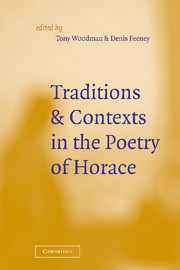Book contents
- Frontmatter
- Contents
- List of contributors
- Prologue
- Acknowledgements
- 1 HORACE'S BIRTHDAY AND DEATHDAY
- 2 AMICVS CERTVS IN RE INCERTA CERNITVR: Epode I
- 3 DREAMING ABOUT QUIRINUS: Horace's Satires and the development of Augustan poetry
- 4 BIFORMIS VATES: the Odes, Catullus and Greek lyric
- 5 THE ODES: just where do you draw the line?
- 6 A WINE-JAR FOR MESSALLA: Carmina 3.21
- 7 FEMININE ENDINGS, LYRIC SEDUCTIONS
- 8 THE UNIQUENESS OF THE CARMEN SAECVLARE AND ITS TRADITION
- 9 SOLVS SAPIENS LIBER EST: recommissioning lyric in Epistles 1
- 10 POETRY, PHILOSOPHY, POLITICS AND PLAY: Epistles 1
- 11 HORACE, CICERO AND AUGUSTUS, OR THE POET STATESMAN AT EPISTLES 2.1.256
- 12 VNA CVM SCRIPTORE MEO: poetry, Principate and the traditions of literary history in the Epistle to Augustus
- 13 EPILOGUE
- Notes
- Abbreviations and bibliography
- Indexes
12 - VNA CVM SCRIPTORE MEO: poetry, Principate and the traditions of literary history in the Epistle to Augustus
Published online by Cambridge University Press: 22 September 2009
- Frontmatter
- Contents
- List of contributors
- Prologue
- Acknowledgements
- 1 HORACE'S BIRTHDAY AND DEATHDAY
- 2 AMICVS CERTVS IN RE INCERTA CERNITVR: Epode I
- 3 DREAMING ABOUT QUIRINUS: Horace's Satires and the development of Augustan poetry
- 4 BIFORMIS VATES: the Odes, Catullus and Greek lyric
- 5 THE ODES: just where do you draw the line?
- 6 A WINE-JAR FOR MESSALLA: Carmina 3.21
- 7 FEMININE ENDINGS, LYRIC SEDUCTIONS
- 8 THE UNIQUENESS OF THE CARMEN SAECVLARE AND ITS TRADITION
- 9 SOLVS SAPIENS LIBER EST: recommissioning lyric in Epistles 1
- 10 POETRY, PHILOSOPHY, POLITICS AND PLAY: Epistles 1
- 11 HORACE, CICERO AND AUGUSTUS, OR THE POET STATESMAN AT EPISTLES 2.1.256
- 12 VNA CVM SCRIPTORE MEO: poetry, Principate and the traditions of literary history in the Epistle to Augustus
- 13 EPILOGUE
- Notes
- Abbreviations and bibliography
- Indexes
Summary
On the first day of fighting at Philippi, the watchword and battlecry for the tryannicides' army was the inspiring ‘Libertas’. It is probable, however, that the 22-year-old Horace did not hear it – as if in anticipation of the confused failure to come, the tickets with the watchword were still being passed along to the officers when Brutus' legions spontaneously hurled themselves against the forces of Caesar opposite. Returning to Rome after the eventual catastrophe of the Republican cause, Horace carried on his fumbled engagement with libertas as he tackled the two genres, one archaic and Greek, one only a century old and Latin, whose entire raison d’être consisted in the exercise of unrestrained outspokenness; as has often been remarked, his Epodes and Satires make a major theme out of why and how they do not live up to their generic trademarks in the unparalleled political environment of triumviral Rome.
The transformations of the conditions for speech in the ever-changing Principate continued to engage the poet throughout his career, as he and his near coeval, Caesar Augustus, remade their respective traditions. In what is very probably his penultimate work, possibly his last, the Epistle to Augustus, Horace addresses the man against whom he fought thirty years before, each of them now supreme in his own field. They have both reached their position of classic status in a surprisingly short time and from beginnings which had promised any outcome but this.
- Type
- Chapter
- Information
- Traditions and Contexts in the Poetry of Horace , pp. 172 - 187Publisher: Cambridge University PressPrint publication year: 2002
- 8
- Cited by



